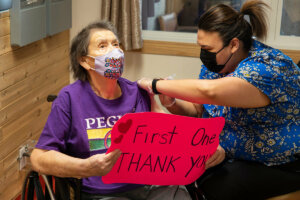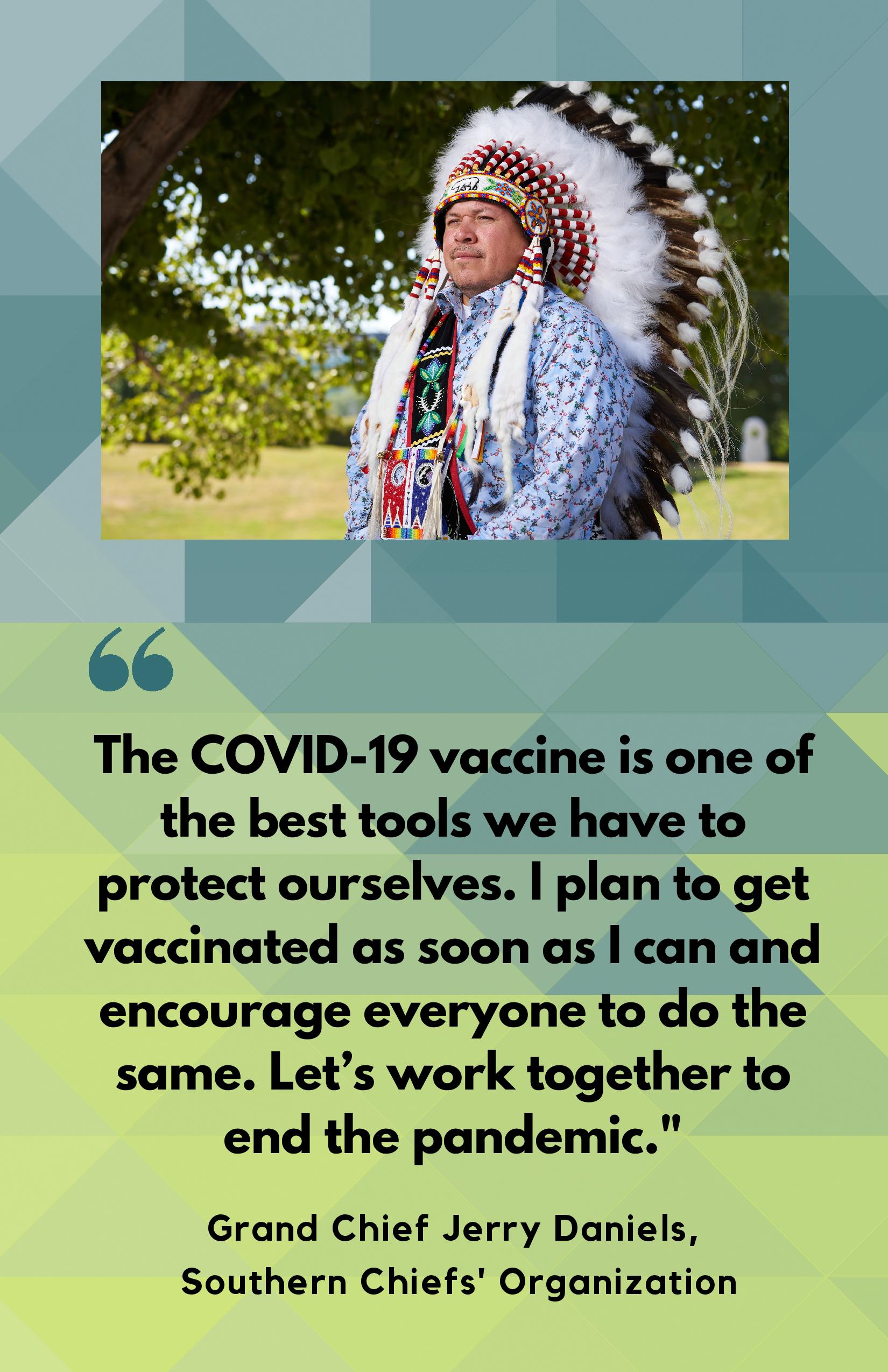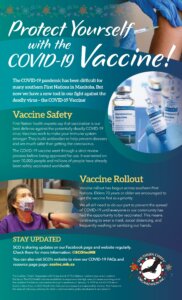The COVID-19 vaccine is now available to our southern First Nations for vaccinating their community members, starting with priority groups.
When the vaccine is available to you, we encourage everyone to get vaccinated to protect yourself and others against this deadly virus, which is having a disproportionate impact on our communities and citizens. Statistics show the COVID-19 virus is hurting First Nation people more than any other population in Canada. We need to do everything we can to stop this virus and to keep ourselves, our loved ones, and our communities safe!
Check out our COVID-19 Vaccine Frequently Asked Questions (FAQ) below for reliable information on the COVID-19 vaccine.
You can also view the FAQ factsheet in PDF and print to have a physical copy for yourself and your loved ones.
FREQUENTLY ASKED QUESTIONS
Why should I get a COVID-19 vaccine?
Vaccines make your immune system stronger. They build antibodies to help prevent diseases. Immunization is much safer than getting the potentially deadly COVID-19 virus.
Vaccines also provide protection for certain people who cannot get the vaccine, such asimmunocompromised people and people with certain allergies. If the majority of people in a community are vaccinated, that helps prevent the spread of the virus, which protects the health of the whole community.
Why are First Nation people a priority at this time?
First Nation people are a priority at this time for a number of reasons, including:
- First Nation people are particularly vulnerable to this deadly virus, largely due to colonial legacies which have led to lower health outcomes overall.
- While the overall test positivity rate is close to 10% for all Manitobans, that number jumps to nearly 17% for First Nation people.
- First Nations make up close to 60% of all active cases in the province and 40% of new cases.
- First Nations are over-represented in hospitalizations and ICU admissions due to COVID-19.
- Unlike the majority of cases in Manitoba, First Nations people are most likely to be infected through close contact to known cases of COVID-19
Is the COVID-19 vaccine safe?
Yes!
All vaccines are peer-reviewed and analyzed for their safety and effectiveness before they are granted approval by Health Canada. They have to go through a strict vetting process and must be shown to be safe and effective before they can be used. After approval, they continue to be monitored closely for their safety and effectiveness.
Four vaccines have been approved by Health Canada so far for use, Moderna, AstraZeneca, Janssen, and Pfizer. Millions of people worldwide have already been vaccinated with more people receiving the COVID-19 vaccine every day!
First Nation Health experts have advised us that this is the best tool we have to protect First Nation people from the coronavirus.
I am hesitant to get a COVID-19 vaccine, what should I do?
Some people are hesitant to get vaccinated against COVID-19 for a variety of reasons, including concerns and feelings of mistrust towards the Canadian medical establishment, inaccurate information shared about vaccines online and on social media, and the fact that the COVID-19 vaccines have been produced relatively quickly.
First Nation health experts encourage everyone to be vaccinated as our best defense against this deadly virus, which has had a disproportionate affect on First Nation people, communities, and livelihoods.
If you’re still hesitant after reading this FAQ guide then we highly recommend for you to contact your local health station or clinic where you can get trustworthy information on the vaccine, its distribution, and any other questions you may have.
What is the difference between the vaccines?
All of the vaccines offer excellent protection against the COVID-19 virus. Early results from clinical trials show the Moderna vaccine to be 94% effective at preventing COVID-19 infections that produce symptoms. You are still able to get the virus and spread it after being vaccinated,however, you are far less likely to experience serious outcomes from the virus.
The Moderna vaccine, which is given in two doses several weeks a part, gives the immune system a preview of what the real virus looks like without causing the disease. This preview gives the immune system time to design powerful antibodies that can neutralize the virus and protect us from infection.
Why are First Nations receiving the Moderna vaccine, not a difference vaccine?
All vaccines are shown to be highly effective, but the Moderna vaccine is easier to transport and was therefore selected for shipment to First Nations. Other vaccines, such as Pfizer, are more difficult to transport.
First Nation people who are eligible can also be vaccinated at one of the province’s supersites, located in Winnipeg, Brandon, Morden, Thompson, and Selkirk, or one of the various provincial pop-up clinics. You can book an appointment online or by calling 1-844-626-8222. We encourage everyone who is eligible to receive a vaccine, any vaccine, to be vaccinated!
When can I get vaccinated?
Since all COVID-19 vaccines are new, supply is limited at this stage. In March, the Vaccination Implementation Task Force (VITF) shared that 100,000 doses of the vaccine would be administered in all Manitoba First Nations and adjacent Northern Affairs communities in 100 days!
Each First Nation has been allocated doses to match 75 per cent of the adult population aged 18 and older. This number is based on predicted uptake, which is based on actual uptake during the first phase of immunization in First Nations in January and February. More doses can be ordered for communities as needed.
Once vaccine doses have arrived in a First Nation and the community’s vaccination site is ready, then all adults living in the community aged 18 and older will be eligible for vaccination. All SCO member First Nations will receive their vaccine shipment no later than the week of April 12 and second doses will be delivered as close as possible to 28 days after the first dose shipment.
We strongly encourage everyone who is eligible and able to get vaccinated!
I live off-reserve, when and where can I get vaccinated?
As mentioned above, First Nation people living off reserve can access provincial vaccination supersites and pop-up clinics when they become eligible for vaccination. You must book an appointment first by calling 1-844-626-8222 or you can book online. You will be asked to self-identify as First Nations as part of the appointment-booking process. The call centre is open seven days a week from 6:00 AM – 8:00 PM. Please note that family members and caregivers can make an appointment on a loved one’s behalf.
As part of the piloted roll-out of the AstraZeneca vaccine, First Nation people aged 30-64 with a high-risk condition are the first group eligible to receive the AstraZeneca/Covishield vaccine. People with high-risk conditions (as determined by their doctor or pharmacist) will be prioritized.
Who should NOT get the COVID-19 vaccine?
Several different groups of people are not able to receive the vaccine, including immune- comprised people, infants, and children under the age of 16 for the Pfizer-BioNTech vaccine, individuals under the age of 18 for the Moderna vaccine, and as of now, individuals over the age of 65 for the AstraZeneca vaccine.
The COVID-19 vaccine should not be given to anyone who is allergic to the active substance or any ingredient in the vaccines, or if you have had a severe allergic reaction after the first dose.
Pregnant people and those who are breastfeeding should consult with their doctor or medical professional.
Are there side effects from COVID-19 vaccines?
While safe, there can be side effects from the COVID-19 vaccine, but they tend to be mild and go away in a few days, similar to a flu shot. It’s also very normal and natural to experience some side effects as your immune system responds to the vaccine’s healing components.
Responses may include:
- redness, swelling, or feeling sore where you had the needle
- feeling tired
- headache
- fever or chills
- body aches or sore joints
- feeling sick to your stomach (nausea), vomiting (throwing up), or loose stool (diarrhea)
- swollen lymph nodes
After you receive the vaccine, you will be monitored for at least 15 minutes in the unlikely event you experience an allergic reaction (hives, swelling of the throat, etc.).
If you experience an adverse event or medical condition of concern after you leave the place of vaccination, contact your health station/clinic or call Health Links–Info Santé in Winnipeg at 204-788-8200, or toll free elsewhere in Manitoba at 1-888-315-9257.
Is there a cost to getting a COVID-19 vaccine?
No! All COVID-19 vaccines are free of cost.
Once I get the COVID-19 vaccine, can I stop wearing a mask and social distancing, and go back to ‘normal’ life?
Unfortunately, we are still far away from when we can return to ‘normal’ pre-COVID -19 life.
You should continue to:
- Follow all health orders until the majority of people are vaccinated
- Stay at home when sick
- Practice social distancing and wear a mask when in an indoor public space
- Wash/sanitize your hands frequently and avoid touching your face when out in public
- Limit social contacts as much as possible
First Nation people aged 75 and older are now eligible to schedule an appointment to receive the COVID-19 vaccine.
You must call 1-844-626-8222 book an appointment in order to be vaccinated. Call centre is open seven days a week from 6:00 AM to 8:00 AM.
Family members and caregivers can make an appointment for you. You will be asked to self-identify as First Nation as part of the appointment-booking process.
What you need to know when getting your vaccine:
- Bring your health card, or another type of identification (such as driver’s license).
- Wear a mask.
- Wear a short sleeved shirt.
- If needed, you can bring a helper such as a caregiver or family member (who must also wear a mask).
- Be prepared for a 45-minute stay at the site.
Additional Resources
First Nations Health and Social Secretariat of Manitoba – COVID-19 page
Province of Manitoba COVID-19 Vaccine resource page
COVID-19 Vaccine Fact Sheet – Public Health Agency of Canada (PDF)
COVID-19 Vaccine Reaction Fact Sheet – Province of Manitoba (PDF)
What you need to know about the COVID-19 vaccine – Government of Canada (PDF)
COVID-19 Vaccine Info Poster – Government of Canada (PDF)
Let’s Stop COVID – Vaccine Info Poster – Government of Canada (PDF)




